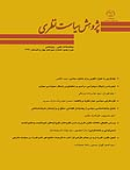کثرتگرایی سیاسی: میان نظریه و واقعیت
محورهای موضوعی : پژوهش سیاست نظری
محسن عباسزاده
1
![]() ,
فرزاد سوری
2
,
فرزاد سوری
2
1 -
2 -
کلید واژه: سیاست دموکراتیک کثرتگرایی گروه ذینفوذ پسامدرنیته ارتباطات رسانهای,
چکیده مقاله :
از بنیادی ترین پرسش های پیش ِ روی سیاست پژوهان، موضوع قدرت، الگوهای توزیع آن، کیفیت رابطۀ حکومت با شهروندان و گروهها و میزان تأثیرگذاری آنها بر فرایند تصمیمگیری سیاسی است. هدف کثرت گرایی در مقام رویکردی نظری به سیاست نیز تبیین و ارزیابی این مسایل بود. از اینرو سیاست را عرصۀ رقابت گروههای مختلفی تعریف می کرد که به دلیل دسترسی شان به منابع متفاوت، هیچ یک قادر به تسلط کامل بر سایرین نبوده، تصمیمات سیاسی نیز حاصل توازن نیروها و فرایندی گشوده تلقی میگشت. این مقاله پس از تبیین این رویکرد در پیوند با اندیشۀ دموکراسی و مقایسۀ برداشت های متقدم و متأخر از آن، به بررسی دلا لت های عینی آن در نظم سیاسی میپردازد تا صحت تحلیل های آن را در عمل ارزیابی کند. بنابراین در پاسخ به این پرسش که آیا واقعیت سیاسی موجود، مؤیّد مفروضات تئوریک رویکرد کثرت گراست، موضعی بینابینی (بسته به نوع برداشت از کثرت گرایی) اتخاذ می کند.
Power, its distribution, and the quality of government relation with citizens and groups and the amount of their influence on the political decision-making processes are of the most fundamental questions encountering politics researchers. The aim of pluralism in status of a theoretical approach toward politics is specification and measurement of these issues; therefore, it defines politics as the arena of competition for different groups who have access to different sources; as a result, no single group can dominate others completely, and political decisions were seen as the outcomes of balance among forces and an open process. After specifying this approach in association with the democratic thought and the comparison of previous and recent conclusions of it, this article reviews its concrete implications in political order so as to assess the accuracy of its analyses in practice; therefore, in answering to this question that do the available political reality assert the theoretical hypotheses of the pluralist approach, it takes an intermediate status (depending on the kind of conclusion from pluralism).


